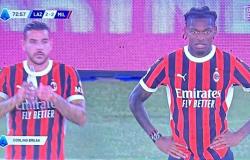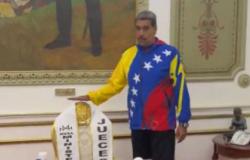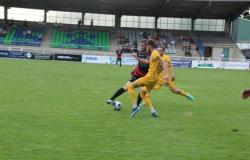31 August, ZDF, 8.15 p.m.
Every crime story is also a drama, after all, there are not only victims but also relatives. This is especially true for the ZDF series “In Wahrheit”.
The films want to tell more than just about investigative work. In the eighth episode there is a moment that is typical of this attitude: the former girlfriend of a murdered young woman meets her father in the cemetery. The man was against the relationship, perhaps he couldn’t accept that his daughter was a lesbian, but now the two are reconciled. This touching moment has nothing to do with finding the truth, but it does provide an empathetic extension of the usual crime story formula, in which there is usually not much room for grief.
Otherwise, Mathias Schnelting tells a not particularly unusual crime story in his second “In Wahrheit” script after “Jette ist tot” (2018): After finding a suffocated practice assistant in a Saar weir, the French forensic doctor (Sandra Bourdonnec) remembers a murder that took place five years ago on the other side of the border. The victim was a nurse, and both women were anaesthetized with an anesthetic. At that time, a pharmaceutical representative was put on trial, but Serge Roubaix (Jean-Luc Bubert) was acquitted due to lack of evidence. When Judith Mohn (Christina Hecke) visits the man’s public defender, Schnelting, who has written the screenplays for various worthwhile “Helen Dorn” crime series (ZDF), brings another appealing element into play: The policewoman’s interest in Alain Montand (Pierre Kiwitt), who has changed professions and taken over his parents’ winery, goes noticeably beyond the professional level.
Her feelings will of course get the detective into trouble later, because now she is no longer impartial, as her colleague Breyer (Robin Sondermann) rightly points out. First, however, the duo concentrate on the boss of the second victim: During his first visit to Christian Peters’ practice, Breyer notices that the doctor is getting too close to his female employees.
Surveillance camera images from a hotel lobby prove that the doctor and the employee had a heated argument shortly before her death: He had reserved the “honeymoon suite” and she apparently did not want to accompany him. However, the doctor as the perpetrator would be an insult to the intelligence of all crime fans, especially since the casting of Tobias van Dieken already suggests that this is a diversionary tactic.
The legal background of the second level is much more interesting, because Schnelting dealt with the principle of “Ne bis in idem” when he was writing his screenplay: No one may be accused of a crime twice, unless there is a confession. This does not give too much away, as the film title suggests. It refers to a quote from Mohn: Law and justice are like two royal children who do not always get along. The working title “Late Revenge” is even clearer. Montand gives an evasive answer to the commissioner’s question about his opinion on the old case, but later admits that he was convinced of his client’s guilt.
More appealing than the emerging development of the crime story are the interpersonal relationships, which were well implemented by the previous “Soko” director Kirsten Laser thanks to the cast and the good cinematography (Rodja Kükenthal). The scenes with Christina Hecke and Pierre Kiwitt are particularly likeable, especially since, as the son of a French mother and a German father, he is also linguistically well cast in the bilingual role. This makes it all the more unbelievable that Montand ends up having a long dialogue with a fellow countryman in German, both with a strong accent. The film’s beautiful moments, however, include the appearances of Steffi Kühnert as Mohn’s mother and Rudolf Kowalski as ex-inspector Zerner, who is not needed as a criminal investigator this time, but as a strong shoulder.
Otherwise, “Between Law and Justice” is not particularly out of the ordinary, especially when compared to earlier films in the series that started in 2017. In addition to the romance that is always a continuation, what is particularly memorable is the clever link between the prologue and a flashback towards the end, when a change in focus confirms the solution to the case. The diverse music by Hansjörg Kohli is also worth listening to.
More about TV tip






